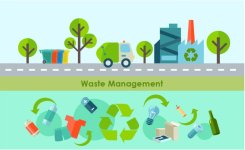Waste isn't just trash—it's a growing challenge affecting our environment, health, and economy. As cities expand and consumption habits evolve, managing waste effectively has become crucial worldwide. Good waste management involves collecting, sorting, recycling, and disposing of waste in ways that minimize harm to our planet and communities.
Why Waste Management Matters
1)Environmental Protection
Improper waste disposal pollutes our world. Landfills release methane—a greenhouse gas far more potent than carbon dioxide. Meanwhile, plastic waste chokes oceans, harming marine creatures and eventually reaching our dinner tables.
2)Public Health
Waste heaps become breeding grounds for disease carriers. When trash burns, it releases fumes that trigger breathing problems, particularly among children and seniors. Clean communities are healthier communities.
3)Economic Opportunity
Recycling creates jobs and saves resources. When we treat waste as valuable material, we build circular economies that reduce costs and spark innovation. Communities with effective waste systems attract more visitors and investments.
4)Waste Management on the National Stage
A country's approach to waste reflects its values and vision. Nations with effective waste systems enjoy cleaner cities, healthier citizens, and stronger environmental reputations.
India faces particular pressure, generating over 62 million tonnes of waste yearly—a figure that keeps climbing. Major cities struggle with overflowing landfills while many regions still lack basic waste infrastructure.

Kerala’s Unique Waste Management Policy
Kerala's Solid Waste Management Project represents a fresh approach, with its ₹2,400 crore investment empowering 93 urban bodies to implement modern, decentralized waste systems.The heart of this initiative is the Haritha Karma Sena—33,000+ trained women who collect and sort waste door-to-door. Their work transforms waste management from a mere technical challenge into community action.
What makes Kerala's model worth noting is its focus on public ownership and grassroots leadership—elements that could inspire similar efforts throughout India.
Separating waste at home food scraps, recyclables, hazardous items)
Waste management goes beyond keeping streets tidy. It protects our natural world, improves public health, and strengthens local economies. Projects like Kerala's offer practical hope and direction.By viewing waste as a resource rather than a problem, we open paths to sustainability and community resilience. The future depends on mindful consumption, effective policies, and active citizen involvement.
After all, managing waste well means managing life well—for ourselves, our communities, and generations to come.
Why Waste Management Matters
1)Environmental Protection
Improper waste disposal pollutes our world. Landfills release methane—a greenhouse gas far more potent than carbon dioxide. Meanwhile, plastic waste chokes oceans, harming marine creatures and eventually reaching our dinner tables.
2)Public Health
Waste heaps become breeding grounds for disease carriers. When trash burns, it releases fumes that trigger breathing problems, particularly among children and seniors. Clean communities are healthier communities.
3)Economic Opportunity
Recycling creates jobs and saves resources. When we treat waste as valuable material, we build circular economies that reduce costs and spark innovation. Communities with effective waste systems attract more visitors and investments.
4)Waste Management on the National Stage
A country's approach to waste reflects its values and vision. Nations with effective waste systems enjoy cleaner cities, healthier citizens, and stronger environmental reputations.
India faces particular pressure, generating over 62 million tonnes of waste yearly—a figure that keeps climbing. Major cities struggle with overflowing landfills while many regions still lack basic waste infrastructure.

Kerala’s Unique Waste Management Policy
Kerala's Solid Waste Management Project represents a fresh approach, with its ₹2,400 crore investment empowering 93 urban bodies to implement modern, decentralized waste systems.The heart of this initiative is the Haritha Karma Sena—33,000+ trained women who collect and sort waste door-to-door. Their work transforms waste management from a mere technical challenge into community action.
What makes Kerala's model worth noting is its focus on public ownership and grassroots leadership—elements that could inspire similar efforts throughout India.
Separating waste at home food scraps, recyclables, hazardous items)
- Composting organic material to create soil nutrients
- Recycling paper, glass, metal, and appropriate plastics
- Properly handling non-recyclables to minimize environmental harm
- Building public awareness through education and example
Waste management goes beyond keeping streets tidy. It protects our natural world, improves public health, and strengthens local economies. Projects like Kerala's offer practical hope and direction.By viewing waste as a resource rather than a problem, we open paths to sustainability and community resilience. The future depends on mindful consumption, effective policies, and active citizen involvement.
After all, managing waste well means managing life well—for ourselves, our communities, and generations to come.
